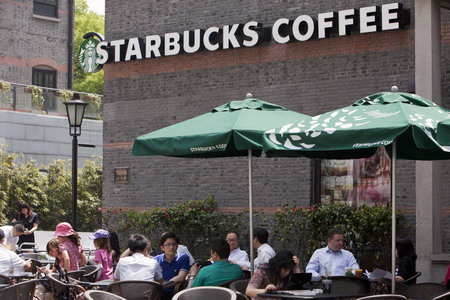Companies
Starbucks buys back control of stores
By Tang Zhihao (China Daily)
Updated: 2011-06-03 10:33
 |
Large Medium Small |
|
 |
|
Customers sit outside a Starbucks coffee shop in Shanghai. Aiming to secure stronger control and better execution, the retailer has bought back the ownership of cafes from its partners in some provinces in China. [Photo / Bloomberg] |
SHANGHAI - The US-based coffee retailing giant Starbucks Coffee Company announced on Thursday that it is to acquire full ownership of all its stores in China from joint venture partner, Maxim's Caterers Ltd.
In a press release, Starbucks said the agreement would allow it to boost profitability in China through direct control of more than half of Starbucks stores in Chongqing municipality and five other provinces, including Hainan and Sichuan.
As part of the agreement, Maxim's will have 100 percent control over Starbucks stores in Hong Kong and Macao. The exact consideration paid for this deal was not revealed.
Eyeing the huge profits generated in China's market, Starbucks has long been committed to gaining direct control over the stores.
| ||||
"Full ownership of stores in Central, South and West China is part of our broader strategy to build China as our second home market outside of the United States and will allow us to accelerate growth," said John Culver, president of Starbucks Coffee International.
Starbucks had three partners when it entered China's market in the 1990s including Maxim's and Uni-President Group.
The partnership between Starbucks and Maxim's started more than 11 years ago in Hong Kong, with the opening of the first store in Hong Kong's Exchange Square.
Starbucks revealed that it plans to have 1,500 Starbucks-branded stores in China by 2015.
Coffee consumption in China has boomed in recent years. Figures from the consultant Euromonitor International suggest that the coffee sales revenue in the country was 5.22 billion yuan ($805.08 million) in 2010.
Euromonitor estimates that sales revenue will be 8.59 billion yuan in 2015, as the company benefits from the growing caf culture.
Though Starbucks is optimistic about expanding in the Chinese market, industry analysts raised questions on whether the retailer could do as well as it has in other overseas markets.
"Starbucks has accumulated abundant direct-management experience in foreign countries, however, the business model it adopted may not be suitable for China's market," said Jian Aihua, an analyst from China Investment Consulting.
"And the capital requirement will be higher to acquire stores in China."
Euromonitor also pointed out that people's preference for speed and convenience when dining out would have a negative impact on cafes and certain full-service restaurants because they are typically time consuming.
Realizing the importance of localization, Starbucks stores in China have adopted certain Chinese foods to tempt local customers, such as Starbucks-styled zongzi, or sticky rice dumplings wrapped in bamboo leaves to celebrate the Chinese Dragon Boat Festival.
However, some Chinese consumers said they can't relate the products sold in Starbucks to Chinese culture.
"When I look at Starbucks-styled zongzi, I can hardly relate them to the Dragon Boat Festival. I think it is more like a Western-style desert," said Shanghai resident, Zhao Ru.
| 分享按鈕 |



